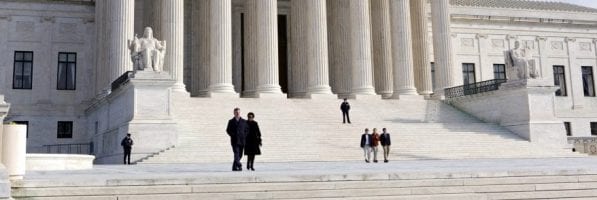Northwestern Kellogg & HKUST Lead the 2018 FT EMBA Rankings

Where should you go to school for your Executive MBA? Good question. While, the answer may not be quite so simple, an official EMBA ranking can help.
There are many things you should consider before choosing the best EMBA program for you including average graduation salary, industry employment, research interests, and more. However, a good place to start is with the 18th edition of the Financial Times Global Executive MBA Ranking. This ranking collects key data from business schools and alumni around the world to come up with a list of the top 100 best programs worldwide.
We’ve collated some of the critical data from the ranking study to give you insight into what’s going on in the world of EMBA programs.
EMBA Graduates Choose Industry and Manufacturing
Compared to full-time MBAs, EMBA graduates are much more likely to work in certain industries like manufacturing. In fact, three times as many EMBAs are employed in industry or manufacturing compared to their full-time peers. The figure accounts for 17 percent of all graduates. In comparison, only 10 percent of EMBA graduates are in consulting roles. And they’re less likely to work in finance, too.
EMBAs Earn More Money
EMBA graduates can also expect to earn more money than full-time MBAs after graduation. The average salary for an EMBA is $220,000 whereas an MBA alumnus can expect to make $146,000. It’s a large gap that’s similar to the salary gap between an MBA and a MiM graduate ($146,000 VS $67,000). Keep in mind, however, that the typical Executive MBA student is significantly older and often has more work experience.
In contrast, full-time MBAs win when it comes to salary boosts before and after earning the degree. MBA alumni generally increase their salary by 107 percent while EMBAs only experience a 59 percent boost.
Top 10 EMBA Programs
This year, the top ten EMBA programs, according to the Financial TImes, includes four joint programs. In fact, these were the top four programs in the world ranking well for post-EMBA salary, alumni leadership positions, and work experience. Each of these programs offer excellent networking opportunities thanks to different cohorts across different campuses, connecting students around the world.
Here’s how all the rankings stacked up.
1. Northwestern Kellogg & HKUST
This joint program ranks first for the third year in a row, and it’s the ninth time in 12 years that it has headed the list—the other three times it ranked second. The program is known for having the highest average salary three years post-graduation, $507,000—$140,000 more than the second-highest salary. It’s also known for having half of its alumni as company leaders three years post-graduation.

No EMBA has dominated the annual FT ranking quite like the Northwestern Kellogg & HKUST join program, earning top billing once again for 2018.
2. HEC Paris, LSE, & NYU Stern
This trium global EMBA program ranks second in 2018, up from fifth the previous year. The program is ranked first in work experience, languages, and international course experience rank. It also ranks highly in average salary ($347,970) with an expected 60 percent salary increase three years post-EMBA.
3. Tsinghua University & INSEAD
For the second year in a row, the Tsinghua-INSEAD dual degree MBA comes in third overall on the FT EMBA ranking. Located in China, Singapore, France, and the UAE, the program is known for its high salary three years post graduation ($365,746), and its high percentage of female students (45 percent).
The rest of the top ten shakes down as follows:
- EMBA—Global Asia: Columbia Business School, HKU, & London Business School
- Ceibs
- HEC Paris
- Washington University Olin Business School
- Shanghai: Jiao Tong University Antai
- IESE Business School
- MIT Sloan School of Management
Surprising Schools
There were quite a few surprises in this year’s EMBA ranking.
- Though HEC Paris has ranked in the top five since 2006 because of its joint program with NYU Stern and LSE, this was the first year the school entered the top ten ranking on its own. The HEC Paris solo EMBA program ranks sixth overall, making it the highest new entrant.
- IESE Business School took home the crown as the top EMBA program for the new criterion corporate social responsibility (CSR).
- The University of Toronto Rotman School of Management EMBA moved up the most places in 2018, rising to 47th place overall—20 places higher.

No school saw a bigger rankings jump than the University of Toronto Rotman School of Management, rising 20 spots in 2018.
FT EMBA Ranking Methodology
To come up with the 2018 EMBA ranking, the Financial Times reached out to a record 139 programs with two online surveys: the first completed by the school and the second by alumni who graduated from programs in 2014. The methodology of the ranking is as follows:
- Alumni were required to provide feedback on salary today, salary increase, career progress, work experience, and aims achieved—accounting for 55 percent of the ranking’s weight.
- Schools provided insight into ten criteria, accounting for 35 percent of the total ranking. Criteria included: gender and international diversity, board members, international program reach, and more.
- Accounting for the final 10 percent of the ranking was the FT research rank, which looks at the number of articles published by a school’s full-time faculty.
And, for the first time ever, this year’s EMBA ranking included a new criterion for corporate social responsibility (CSR). This new criterion took a look at how many of a school’s core courses were dedicated to ethics, social, and environmental issues. Weighting at 3 percent, this criteria replaced the number of Ph.D. graduates per school.
Working From Home, Maximizing Profits, and More – Chicago News

Let’s explore some of the most interesting stories that have emerged from Chicago business schools this week.
Are You a Different Person at Work Than at Home? Compartmentalizing Like This Can Lead to Unethical Decisions – Kellogg Insights
Northwestern Kellogg Assistant Professor of Marketing Maferima Touré-Tillery and the University of the Sciences’ Alysson Light coauthored new research, which finds that “people who perceive their personalities as constant across their roles are more likely to behave ethically than those who think of themselves differently in each role.”
Touré-Tillery explains, “If I tend to think about myself the same way from one identity to the next, then if I do something that’s going to make me feel bad about myself, it’s likely that I’ll feel bad about myself across all of my identities.”
She adds, “Every unethical thing amplifies that sense of being a bad person. By having them merge their work and personal lives, you are helping them merge their identities as parent and worker—so they might behave more morally across the board.”
You can read the full Kellogg Insights article here.
Should Public Companies Do More Than Maximize Profits? – Chicago Booth
At a recent panel discussion hosted by Chicago Booth’s Rustandy and Stigler Centers, BlackRock Co-founder Sue Wagner and Booth’s Luigi Zingales and Marianne Bertrand dissected BlackRock CEO Larry Fink’s letter to his fellow CEOs, imploring them to engage more deeply with social issues as part of their long-term strategies.
Moderator Robert H. Gertner explains, “We have seen greater discussion, both within and outside of academia, about the role of corporations. It has come from consumers, from employees, from the government, from academics, and from investors. Perhaps this letter from Larry Fink may go down as a sort of cornerstone of this discussion.”
You can read the full exchange between all the panelists here.
Tech Leader Shares His Views On Innovation, Autonomous Vehicles, and Purpose – Gies School of Business News
The University of Illinois Gies College of Business recently hosted Mobileye ASIC Department Project Manager and Founding Engineer Mois Navon, who discussed how his company’s purpose has driven their success.
The Israeli-based Mobileye is “one of the leaders in driver assistance technology and autonomous vehicle research.” According to the article, “the demonstrated ability of [Mobileye’s] products to help prevent accidents led insurance companies to give discounts to people who used them. People were getting into fewer accidents, and the accidents they did get into were less severe.”

Navon explains Mobileye’s purpose within the Jewish concept of tikkun olam, which means “fixing the world.”
“I think that technology is that driving force for fixing the world—even though new technologies can engender difficult transitions. I think humanity is ultimately driven by purpose. We’re here to fix ourselves. We’re here to fix the world. And I hope you’ll join me.”
You can read more about the company and Navon’s speech at Gies here.
Business School Experts on the Glass Ceiling, and More – Chicago News

Let’s explore some of the most interesting stories that have emerged from Chicago business schools this week.
Here’s a Better Way to Schedule Surgeries – Kellogg Insight
Northwestern Kellogg Associate Professor of Operations Chaithanya Bandi and McCombs’ Diwakar Gupta recently published new research that focuses on how hospital administrators can optimize operating room schedules “while still satisfying surgeon needs.”
According to the article, “the researchers developed an innovative algorithm to improve OR operations, minimizing the number of ORs hospitals had to keep open, while still honoring surgeon requests,” which can drive savings of anywhere from 10-25 percent in OR costs and “lead to lower healthcare costs and thus lower insurance premiums.”
Bandi explains, “In healthcare settings, these kinds of savings don’t translate immediately to consumers. But better utilization of OR capacity helps the hospital see more patients in a shorter period of time, with lower rejections or delays for surgery requests.”
Bandi hopes to apply an “algorithm similar to the OR-optimization model to help data centers improve project efficiency. “Projects like these can take hours to run and incur very large energy costs. By some estimates, as much as 12% of the world’s total energy goes toward these projects.”
You can read more from Kellogg Insight here.
The Glass Ceiling: Three Reasons Why it Still Exists and is Hurting the Economy – Chicago Booth News
In a new working paper entitled “The Glass Ceiling,” Chicago Booth Professor Marianne Bertrand outlines three factors “why the glass ceiling persists in excluding women from top-paying jobs.”
- Women with college degrees often choose to work in fields that offer lower incomes.
- Psychological differences between men and women could account for up to 10 percent of the pay gap.
- The demands for child care, housework and other life chores outside of work fall more heavily on women than on men.
She explains, “In a world where talent is distributed equally among women and men, an economy that does not fully tap into the leadership skills offered by women is necessarily inefficient. Talent is left on the table when women are not placed in leadership positions, and the economy suffers.”

Chicago Booth Professor Marianne Bertrand
You can read more from Chicago Booth News here and check out “The Glass Ceiling” here.
‘We All Lose’ in Trade War, Says Gies Business Professor – Gies College of Business News
The University of Illinois Gies College of Business blog spoke with Professor of Finance Don Fullerton to understand the potential long-term ramifications of recent trade tensions between the U.S. and China.
The U.S. recently announced 10 percent tariffs on $200 billion of Chinese goods [like] industrial machinery parts, food seasonings, and network routers, while China countered with tariffs on $60 billion worth of American meat, chemicals, and clothes, which are set to increase to 10-25 percent by the end of the year.
“There’s going to be significant costs to bear. A lot of economists were arguing strongly against a trade war because in the long run we all lose. We’ll end up paying more for all kinds of goods. We’ll pay more for domestically-produced goods because we don’t get to buy the cheap imports anymore. And the goods we do import, we’ll pay more for because of the tariffs.”
You can read the Gies College of Business News here.
Supreme Court Ideology, Deniability, and More – Chicago News

Let’s explore some of the most interesting stories that have emerged from Chicago business schools this week.
Supreme Court Justices Become Less Impartial and More Ideological When Casting the Swing Vote – Kellogg Insights
In a new paper coauthored by Northwestern Kellogg Associate Professor of Managerial Economics and Decision Sciences Jörg Spenkuch and Emory University’s Tom S. Clark and B. Pablo Montagnes, the trio found that “the effect of a justice’s ideology on how he or she votes essentially doubles when the vote is pivotal.”
Spenkuch explains, “”Our idea of a good judge is that of an impartial umpire. But justices in some cases disregard the role of the umpire in favor of that of the politician.”
“During confirmation hearings, no justice ever admits that they’re interested in making policy. There is a nontrivial number of cases that would be decided differently if justices did not vote strategically. It draws into doubt the notion of the Supreme Court as an institution where litigants come to get justice.”
You can read more about the trio’s research here.
Sidestepping the Pitfalls of Overconfidence with Plausible Deniability – Mendoza Ideas & News
In Notre Dame University Mendoza College of Business postdoctoral Research and Teaching Associate Nathan Meikle’s forthcoming Journal of Personality and Social Psychology paper, he illuminates how people in positions of power—politicians, business leaders—can successfully toe the line between confidence and arrogance.
According to the article, “expressing confidence non-verbally through making eye contact, gesturing, adopting an expansive posture or speaking in a strong voice allows people to enjoy the social benefits of expressing confidence while simultaneously reducing the risk they’ll be punished for overconfidence.”
The key is to leverage plausible deniability — “the ability to deny responsibility due to a lack of concrete evidence.”
Meikle explains, “The plausible deniability hypothesis explains why overconfidence sometimes, but not always, is punished. For example, verifiably overconfident claims, void of plausible deniability, will face consequences. However, there are a number of ways people can create plausible deniability.”
“Future claims necessarily enjoy some degree of plausible deniability because they cannot be proven wrong in the moment,” Meikle continues. “Thus, individuals boasting about future events would be expected to enjoy the benefits of expressing confidence while simultaneously sidestepping the potential costs. However, even if overconfident claims are eventually proven false, people can still create plausible deniability by undermining the messenger, such as calling it ‘fake news.’”

“One strategy is to make audacious claims about future events. President Trump frequently makes bold claims, such as he alone can bring coal mining jobs back to West Virginia,” Meikle explains / Photo via DOMINICK REUTER/AFP/Getty Images
You can read the full article from Mendoza Ideas & News here. “Is Overconfidence a Social Liability? The Effect of Verbal Versus Nonverbal Expressions of Confidence” is also available here.
Hurricane Victims Face Long, Uncertain Road to Recovery – Gies College of Business Blog
U. Illinois Gies College of Business Professor of Finance Tatyana Deryugina, who studies the financial impacts of natural disasters on families, explains that “even after the floodwaters recede … families displaced by Hurricane Florence will face months and months of financial hardship.”
Deryugina explains, “If you have kids, there’s the school closures—so parents might have to figure out what to do with their children in the meantime. Even if your workplace is open, you may not be able to go back and work. Building materials will be expensive in the short-term. A lot of people rebuilding causes supply issues.”
“Even if you rebuild, and it looks nice and new, people are going to remember this event. Not only are you going to face building and repair costs, but now your home is worth less than it was before”
She adds, “What we’re seeing with Florence is rivers overflowing, which is worse than just having the floodwater accumulate from the heavy rain because that’s going to be longer-lasting.”
“New Orleans was below sea level, so the flooding just persisted. The longer areas stay uninhabitable, the more people are going to leave and just not return. If you’re somewhere for a couple months, it becomes much easier to stay there.”
You can read the full article here.
Better Advice, Getting Kids To Stop Drinking Soda, and More – Chicago

Let’s explore some of the most interesting stories that have emerged from Chicago business schools this week.
A New Way to Persuade Kids to Drink More Water and Less Soda – Kellogg Insight
Northwestern University’s Kellogg School of Business recently published an article that surveyed a number of strategies that Associate Professor of Marketing Michal Maimaran and his colleagues pursued in collaboration with UNICEF to encourage children to drink more water and less soda.
Maimaran, Stanford’s Szu-chi Huang, BU Questrom’s Daniella Kupor, and the University of Amsterdam’s Andrea Weihrauch attempted to link “water consumption with different goals that kids might want to achieve” by designing four “Drink Water” posters, each with a distinct message: “Be Healthy,” “Learn Faster,” “Make Friends,” and no message.
According to the research, the only poster that spurred bottled-water sales was “Be Healthy,” which Maimaran believes is likely due to the fact that “kids are persuaded by messages that rely on a natural association between the action and goal, such as between being healthy and water.”
You can read more about the research here.
Capitalizing On Sleep-Wake Cycle Can Drastically Increase Digital Ad Profits From Social Media – Mendoza Ideas & News
Recent research from the Notre Dame University Mendoza College of Business shows that “digital content platforms can increase traffic to their websites from social media and boost digital ad profits simply by aligning their posting schedules with target audiences’ sleep-wake cycles, or circadian rhythms.”
Vamsi Kanuri, Assistant Professor of Marketing at Mendoza explains in his new research that, “Consumers engage more with posts containing high-arousal negative information, including anger, stress, anxiety or fear, in the morning than in the afternoon or evening. They engage more with ‘boosted’ (paid to advertise) posts and those requiring higher cognitive processing, such as op-eds or scientific material, in the afternoon.”
“Scheduling Content on Social Media: Theory, Evidence and Application” is due for publication in the Journal of Marketing soon. You can also find more on the research from Mendoza Ideas & News here.
Why is it Better to Give Advice Than Receive It? – Chicago Booth News

Chicago Booth Professor Ayelet Fishbach
A new study from and Penn’s Lauren Eskries-Winkler and Christopher H. Browne Distinguished Professor of Psychology and famed writer Angela Duckworth found that people tend to “benefit more from giving advice than receiving it.”
According to the study, which was recently discussed in the Chicago Booth News, “the very act of giving the advice makes the giver feel powerful and confident. When people lack motivation, receiving advice may actually be harmful … because it undermines feelings of competence.”
The authors note, “In the process of giving advice, advisers may form specific intentions and lay out concrete plans of action—both of which increase motivation and achievement.”
“We hope our findings, which illuminate the motivational power of giving, do just that: goad scientists and practitioners to consider the ways in which struggling individuals benefit from giving.”
“In Giving We Receive: A Counterintuitive Approach to Motivating Behavior” is due for publication in Psychological Science.
You can read the full article from the Chicago Booth News here.
Political Turnover, Gaming, and Venture Acceleration – Chicago News

Let’s explore some of the most interesting stories that have emerged from Chicago business schools this week.
Why Economic Crises Trigger Political Turnover in Some Countries but Not Others – Kellogg Insight
New research from Northwestern Kellogg Professor of Managerial Economics and Decisions Nancy Qian explores “how much the people of a country typically trust other people” in an attempt to understand why recessions are catalysts for political turmoil in certain countries, like Greece, and not others, like Norway.
Qian explains that trust plays a key role.
“If I’m a less trusting person, I might say something like, ‘I don’t understand the details of what our leader is doing, but most politicians are bad and they’re lazy, so it is probably his fault. It’s about how likely I am to attribute the economic problems to circumstance or luck versus to the political leadership.”
The researchers found that “economic downturns were less likely to cause political turnover in high-trust countries, like Sweden (63 percent) than in low-trust ones, like Italy (29 percent).”
Qian explains that their findings “have direct implications for how nations approach economic interactions.”
“If we think our trade decisions are going to have economic effects in those nations, we need to also consider the potential political consequences,” Qian says. You can read the rest of the research here.
Keep Them Guessing, Keep Them Gaming – Chicago Booth Blog
In a new Journal of Consumer Research study from Chicago Booth Professor Christopher Hsee and the Chinese University of Hong Kong’s Luxi Shen, it was found that “people repeat a task more for an uncertain incentive than for a certain incentive, even when the uncertain incentive is financially worse.”
According to the Chicago Booth Blog entry, “one reason uncertain incentives motivate behavior is the psychological boost consumers get in moving from the unpleasantness of uncertainty to the satisfaction of certainty resolution.”
Hsee and Shen’s research suggests that efforts to entice consumers to repeat behaviors “may be even more successful if consumers don’t know the amount of the reward in advance.”
You can read the full article here and find “The Fun and Function of Uncertainty: Uncertain Incentives Reinforce Repetition Decisions” here.
Spine Injury Inspires Mark Van den Avont to Create Better Sports Mats – Gies College of Business Blog
Following a high school spine injury that broke the T11 and T12 vertebrae during a backflip dismount, current University of Illinois mechanical engineering sophomore Mark Van den Avont founded HexNest with the goal to create safer and more cost-effective mats.
HexNest is an outgrowth of Gies’ iVenture Accelerator through which he received a $2,500 summer housing stipend and a $10,000 grant to fund “product development, buying competitors’ mats and purchasing equipment to make his mats.”
Van den Avont writes:
“iVenture has been extremely important because I was able to work on HexNest full-time over the summer and devote all my energy to it. It’s great being around other entrepreneurs as well. I’ll be at the iVenture Accelerator at 10 pm on a Tuesday night or early Sunday morning, and I’ll look to my left and right, and everybody’s here.”
You can read more about HexNest and Van den Avont’s journey here.
